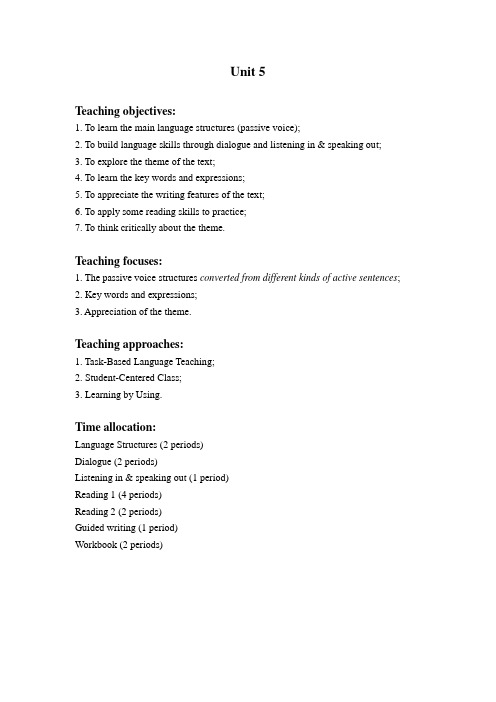book2unit5阅读课件
- 格式:ppt
- 大小:162.50 KB
- 文档页数:4



必修二 Unit 5 Music 音乐I . Vocabularyclassical adj.古典的;古典文艺的古典的;古典文艺的 roll vt. & vi.滚动;(使)摇摆(使)摇摆 n. 摇晃;卷;卷形物;面包圈 rock rock’’n ’roll (rock-and-roll)摇滚乐摇滚乐 orchestra n. 管选乐队管选乐队 rap n. 说唱乐说唱乐 folk adj. 民间的民间的 jazz n. 爵士音乐爵士音乐 choral adj.唱诗班的;合唱队的唱诗班的;合唱队的 the Monkees n.门基乐队门基乐队 musician n.音乐家音乐家 dream of 梦见;梦想梦见;梦想 dream about 梦想梦想 pretend vt.假装;假扮假装;假扮 to be honest 说实在地;实话说说实在地;实话说说实在地;实话说 attach vt. & vi.系上;缚上;附加系上;缚上;附加 attach attach……to to…… 认为有(重要意义); 附上;连接附上;连接 form vt.(使)组成;形成;构成组成;形成;构成 fame n.名声;名望名声;名望 above all 最重要;首先最重要;首先passer-by n.过路人;行人过路人;行人earn vt.赚;挣得;获得赚;挣得;获得extra adj. 额外的;外面的额外的;外面的 instrument n.工具;器械;乐器工具;器械;乐器perform vt. & vi.表演;履行;执行表演;履行;执行performance n.表演;演奏表演;演奏pub n. 酒馆;酒吧酒馆;酒吧in cash 用现金;有现钱用现金;有现钱 studio n.工作室;演播室工作室;演播室millionaire n.百万富翁;富翁百万富翁;富翁play jokes on 戏弄戏弄戏弄 actor n. 男演员;行动者男演员;行动者relay vi. 依赖;依靠依赖;依靠relay on 依赖;依靠依赖;依靠 broadcast n. vi. vt. 广播;播放广播;播放广播;播放 humorous adj.幽默的;诙谐的幽默的;诙谐的 familiar adj.熟悉的;常见的;亲近的熟悉的;常见的;亲近的 be/get familiar with 熟悉熟悉 or so 大约大约 break up 打碎;分裂;解体打碎;分裂;解体 reunite vt.再统一;再联合;重聚 attractive adj.吸引人的;有吸引力的吸引人的;有吸引力的 addition n.加;增加;加法加;增加;加法 in addition 另外;也另外;也 sort out 分类分类 excitement n. 兴奋;刺激兴奋;刺激 ballad n.歌谣情歌;民谣歌谣情歌;民谣 overnight adv.在晚上;在夜里在晚上;在夜里 dip vt. 蘸;浸蘸;浸 tadpole n.蝌蚪蝌蚪 lily n.百合;百合花百合;百合花 confident adj.自信的;确信的自信的;确信的 brief adj.简短的;简要的简短的;简要的 n. 摘要;大纲摘要;大纲briefly adv.简要地;短暂地简要地;短暂地 devotion n.投入;热爱投入;热爱afterwards adv.然后;后来然后;后来 invitation n.邀请;招待邀请;招待beard n.胡须胡须sensitive adj.敏感的;易受伤害的易受伤害的painful adj.疼苦的;疼痛的疼苦的;疼痛的 II. Reading THE BAND THA T W ASN ASN’’T 已逝的乐队已逝的乐队Have you ever wanted to be part of a band as a famous singer or musician?译文:你是否曾想过:作为一名著名歌手或是著名音乐家来加入一个乐队? Have you ever dreamed of playing playing i n in front of thousands of people at a concert, at which everyone is clapping and appreciating your music?译文:你是否曾想过在音乐会上站在成千上万的观众面前进行演出,你是否曾想过在音乐会上站在成千上万的观众面前进行演出,人人为你鼓掌,人人为你鼓掌,人人欣赏你的音乐?人人欣赏你的音乐?【注【注释:①dream of ⑴梦见 eg. 1) I often dreamed of my younger brother soon after I left home.刚离开家时, 我常梦见弟弟。


Unit 5Teaching objectives:1. To learn the main language structures (passive voice);2. To build language skills through dialogue and listening in & speaking out;3. To explore the theme of the text;4. To learn the key words and expressions;5. To appreciate the writing features of the text;6.To apply some reading skills to practice;7. To think critically about the theme.Teaching focuses:1. Thepassive voicestructures converted from different kinds of active sentences;2. Key words and expressions;3. Appreciationof the theme.Teaching approaches:1. Task-Based Language Teaching;2. Student-Centered Class;3. Learning by Using.Time allocation:LanguageStructures (2 periods)Dialogue (2 periods)Listening in & speaking out (1 period)Reading 1 (4 periods)Reading 2 (2 periods)Guided writing (1 period)Workbook (2 periods)Teaching procedures:Part 1 Language structuresStep 1 Ask students to read the sentences and try to find out the grammar point -----passive voicestructures converted from different kinds of active sentencesStep 2 Analyze the following sentences one by one and find out the focus of each sentence:1. Don was made to train the team members in new strategy and tactics.converted from an active sentence containing the make somebody do something pattern2. Ted almost got drowned in the lake.formed by get + -ed participle3. Joe should have been invited to the party.with a past perfect modal auxiliary4. Ron is known to be an all-round sportsman, but he doesn’t want to be interviewedby newspaper reporters.1) converted from an active sentence containing the know / think somebody tobe pattern2) converted from an active sentence containing the want somebody to dosomething pattern.Step 3 Presentation of language structure practiceChange the active sentences into the passive sentences:1. sentences containing the make somebody do something pattern1) The doctor made the patient take the medicine three times a day.The patient was made to take the medicine three times a day.2) The store detective made the shop-lifter go to the manager’s office.The shop-lifter was made to go to the manager’s office.3) The lawyer made the culprit犯人tell his entire story.The culprit was made to tell the entire story.2. sentences containing the auxiliary verb getNotice: The passive auxiliary is normally be, but can sometimes be get. The passive with get is normally found only in an informal style and in constructions without an agent.1)He broke his arm in a fight.His arm got broken in a fight.2) The boy hurt his back when he fell.His back got hurt when he fell.3) Jenny tore her dress on a nail.Her dress got torn on a nail.Step 4 Listen and practice according to the cues.1.Ask the students to practice the conversations in pairs.2.Focuses of practicePractice 1 : Giving information and expressing obligationPractice 2 : Expressing surprise and seeking clarificationPractice 3 : Expressing regretPractice 4 :Expressing unwillingnessPart 2 DialogueStep 1Lead inConsider and answer the following questions:What kind of music do you like most?In your opinion, what can music bring to you?Step 2Background information1.country-western —美国乡村音乐a blend of traditional and popular musicalforms traditionally found the Southern United States that developed rapidly beginning in the 1920s2.the heavy metal type of rock —重金属摇滚乐a genre of rock music anddeveloped in between 1968 and 1974, largely in the United Kingdom and the United States3.new age —新世纪音乐music of various styles intended to create artisticinspiration, relaxation, and optimism4.the bone whistles of the Stone Age —石器时代的石哨5.the digital synthesizers —数码合成器Step 3Listening to the recording and answer the questions on specific details of this dialogue1. How do you define a good stereo system?2. What are the major categories of music?3. What does the word “hi-fi” me an?4. In what direction will music reproduction technology develop in the future?Step 4Language in usethe moment: as soon asTranslation:1) 我一离开房间,孩子们就胡作非为了。

EIM Book 2 Unit 5 Adolescence EIM Book 2 Unit 5 青春期
本单元主要讨论青春期及其带来的身体和情感上的变化。
青春期是从儿童到成人的过渡期,在这一时期内,孩子们的身体和心理状态都发生了很大的变化。
青春期早期通常发生在男孩12-13岁,女孩10-11岁之间,而青春期晚期大约在16-18岁时结束。
在这一时期内,男孩和女孩都会经历身体上的变化,如生长和发育的加快,男孩开始长胡子,声音变低,女孩开始产生月经等。
除了身体上的变化,青春期还会带来一些情感上的变化。
青少年会经历对自己身份、角色和核心价值的重新定义。
他们会更加关注自己的社会地位和同伴关系,并开始思考自己的未来。
青少年也会经历情感上的高峰和低谷,可能会出现情绪不稳定和挑战权威的行为。
了解这些变化很重要,因为它们有助于我们更好地与青少年交流,并帮助他们应对这些变化。
例如,我们可以通过倾听和尊重青少年的想法和感受来建立良好的沟通,帮助他们发展最健康的应对策略。
总之,青春期是充满挑战和机遇的重要时期。
我们需要理解并支持青少年,给予他们足够的支持和指导,帮助他们度过这一难忘的时期。
人教版高中英语必修二(Book 2 Unit 5)Unit 5 Music核心单词1. attach vt.&vi. 系上;缚上;附加;连接常用结构:attach ...to ...附上;连接;系上;把……归于……attach importance/significance/value to sth.认为某事物重要/有意义/有重要价值attach oneself to 依附; 参加(党派等)be attached to 热爱;依恋;附属于精讲精析I attached a wire to the radio.我在收音机上接了一根金属线。
He'll attach the label to your luggage.他会把标签系在你的行李上。
How can you attach the blame for this accident to the driver?你怎么能把这次事故的责任归于司机呢?Although he was seriously ill, he took part in the basketball match because he attached great value to his school sports record. 尽管他病得很重,他还是参加了学校的篮球比赛,因为他把学校的体育纪录看得很重。
He is deeply attached to his mother.他深爱着自己的母亲。
This hospital is attached to the medical college nearby.这个医院附属于附近的那所医学院。
完成句子①很多人认为成为富人和名人很重要。
Many people attach _____________ becoming rich and famous.②我们要把发展经济的工作放在首位。
(primary)We should attach _____________the development of economy.答案:①great importance to ②primary importance to2. form vt. 形成;构成;排列;(使)组成;养成(习惯)联想拓展form用作名词时的固定搭配:as a matter of form 作为一种形式;礼貌上fill out/in a form 填表格take the form of ... 采取……的形式in the form of ... 以……的形式be in/out of form 处于良好/不良的竞技状态易混辨析form/shape/figure这三个名词的一般含义为"形状"或"外形"。
Unit 5 Dreams课内阅读参考译文你做梦吗?1 梦,我们为什么会做梦?梦有意义吗?真的有梦中所见的事成为现实这种事吗?几千年来这些问题一直让人们感兴趣。
过去几十年的科学发展对睡眠的自然过程有了较多的认识,然而对于与梦有关的诸多问题依然没有提供最终的答案,这些问题还要继续困惑我们。
2 人人都做梦——只不过有些人不记得做过梦罢了。
人类脑电波的记录显示我们所有人入睡后就进入梦境。
整个夜晚的大多数时间我们都在做梦,但只有当我们处在REM (眼睛迅速转动) 睡眠阶段时醒来,才会记住所做的梦。
眼睛迅速转动阶段便是我们做梦的时候。
每晚我们有四、五个REM睡眠阶段,第一次出现在入睡后的90分钟左右。
此后,梦期每90分钟复现一次,每次持续15到45分钟,持续时间随着夜晚的深入逐渐增长。
3 睡眠的主要目的(除让我们休息外)也许就是让我们做梦——让我们以一种截然不同的方式回顾我们的生活、我们的忧虑和希望,以及在潜意识中观察自我,把不再需要的资料从记忆中剔除。
4 有些梦可能是由简单的生理原因引起的。
例如,梦到在灼热的煤块上行走很可能是因为睡眠时脚太靠近取暖器。
而梦到想跑但两腿却动弹不了这种令人沮丧的境况,也许是被子裹得太紧的缘故。
闹铃响了而依然熟睡的人则很可能会梦到门铃或电话铃响。
所有这些都是潜意识和意识共同引导和启示我们的简单例子。
5 不过这些从生理的角度进行的解释尚不足以说明为什么我们会做梦。
有些人认为梦纯粹是无稽之谈,仅仅是人脑中电脉冲无的放矢的结果,然而,有些人则认为最简单的梦都具有重要的含义。
6 有些梦反映的内心忧虑是立即可以识别的。
梦见失去工作或者没了房子,也许是反映了真实的忧虑,即便这些忧虑只是潜意识的。
我们大多数人都梦见过必须参加一门很难的课程的期末考试,也许是一门从未修过的,或许是学得很糟的课程。
7 但是,有一些梦并没有这样明显的含义,这是怎么回事呢?多个世纪以来,男男女女都从所谓的解梦字典中寻找答案,这类字典最早的可以追溯到公元前5000年。